Myths and Facts
.png.aspx)
MYTH: Only smokers get cancer.
FACT: The causative association between tobacco use and lung cancer is well established. Although about 72% of lung cancer cases in Canada are due to smoking tobacco, it is still possible to get lung cancer if you have never smoked1. In fact, lung cancer in never-smokers is among the leading causes of cancer related mortality2. The risk factors for lung cancer go far beyond smoking tobacco. They include, among many others; second-hand smoke, radon, asbestos, outdoor air pollution, and personal or family history of lung cancer1.
MYTH: I am too young to get lung cancer.
FACT: Though lung cancer incidence rates tend to be higher among older populations, it is still possible for younger demographics to be diagnosed. The following chart shows the distribution of new lung cancer cases by age group, in Canada (excluding Quebec), for the years 2011-2015*.
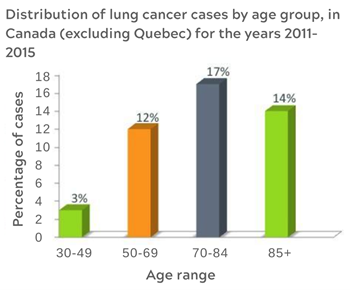
The chart below shows the distribution of lung cancer deaths by age group, in Canada (excluding Quebec), for the years 2011-2015*.
.png.aspx?width=350&height=290)
*Source: Canadian Cancer Statistics Advisory Committee. Canadian Cancer Statistics 2019. Toronto, ON: Canadian Cancer Society; 2019.
Available at: cancer.ca/Canadian-Cancer-Statistics-2019-EN
While it is possible to get lung cancer at a younger age, the survival rate tends to be much higher than when the older demographic is diagnosed. According to the Canadian Cancer Society, the survival for lung cancer is twice as high (35%) among Canadians diagnosed between 15 and 44 years of age than those diagnosed between 75 and 85 years of age (15%) and those between 85 and 99 years of age (9%)3.
MYTH: I won’t get lung cancer because I’ve never smoked.
FACT: About 15% of lung cancers occur in never-smokers in the West, whereas about 30% - 40% of patients with lung cancer are never-smokers from Asian countries12. Second hand smoke, radon, personal history of cancer or other lung disease, family history, and pollutants in the environment can all potentially cause lung cancer.
MYTH: More men and women die from prostate and breast cancer than from lung cancer.
FACT: More people are expected to die from lung cancer (21,200 in 2020) than from colorectal, breast, and prostate cancer combined (19,000 in 2020). This represents approximately 25% of all cancer deaths in 20204.
For both males and females, lung cancer is the leading cause of cancer death. It accounts for approximately 25% of all cancer deaths in men, followed by colorectal cancer (12%) and prostate cancer (10%). For females, lung cancer accounts for about 26% of all cancer deaths, followed by breast cancer (13%) and colorectal cancer (11%)3.
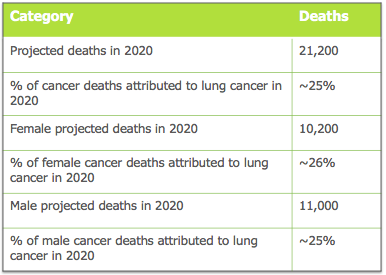
MYTH: Only older men get lung cancer.
FACT: Though 2020 predictions estimates that 15,000 males will be diagnosed with lung cancer this year, it does not infer that females are immune to the disease4. 2020 estimates project that 14,800 women will be diagnosed with lung cancer and 10,200 will die from it. In addition, it is estimated that 1 in 15 Canadian women will develop lung cancer during her lifetime and 1 in 19 will die from it4.
MYTH: Lung cancer isn’t as common as people think it is.
FACT: An estimated 29,800 new lung cancer cases were expected in 2020 alone4. Excluding non-melanoma skin cancer, lung cancer is one of the most commonly diagnosed types of cancer in Canada. Lung cancer accounts for approximately 13% of all new cancer cases, and about 25% of all cancer deaths4.
In addition, it is estimated that about 1 in 15 Canadian women will develop lung cancer during their lifetime and 1 in 19 will die from it. For men, that number is estimated to be 1 in 14 for developing the disease and a 1 in 16th probability of dying from it4.
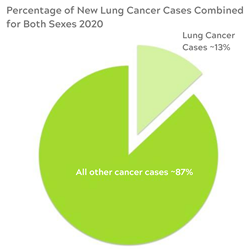
MYTH: I’m more likely to die from other cancers than lung cancer.
FACT: In 2020, it is estimated that 21,200 Canadians will die from lung cancer, making the disease the leading cause of cancer death for both sexes in Canada (25%)4. In addition, the 5 year net survival rate (from 2012-2014) was at 15% for males and 22% for females4.
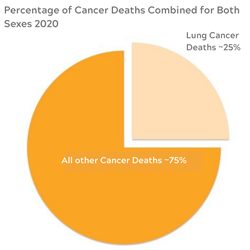
MYTH: Most cases of lung cancer are caught in the early stages.
FACT: The 5 year net survival rate for lung cancer is significantly lower than other cancers, at only 19%5. Part of this is due to inadequate screening options, which leads to many patients being diagnosed at later stages. This makes treatments less effective at being successful, significantly impacting cancer survival. According to the 2019 Canadian Cancer Statistics, 70% of lung cancer patients are diagnosed at a late stage (stage III or IV). Additionally, almost half of all lung cancer cases diagnosed in Canada are stage IV, indicating that the cancer has spread throughout the body3.
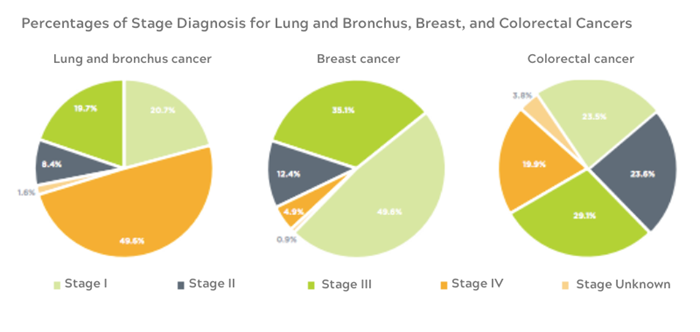
Analysis by: Health Statistics Division, Statistics CanadaData Source: Canadian Cancer Registry database at Statistics Canada
*Excludes Quebec † Includes cases diagnosed inpeople aged 18-79 years
MYTH: I already have lung cancer, there’s no point in quitting smoking now.
FACT: Lung cancer patients who quit smoking have fewer complications after surgery.
• Quitting smoking can improve responses to all forms of cancer therapy
• Quitting smoking after cancer therapy has been associated with a significantly decreased risk of another primary tumour in the lung
• Quitting smoking can help to improve breathing
MYTH: Lung cancer patients bring it on to themselves by smoking.
FACT: Not all lung cancer cases are caused by smoking. About 10-15% of lung cancer patients have never smoked, and obtain the disease through other ways6. Although smoking cessation has been seen to reduce a person’s risk for lung cancer, a 2018 study looking at the risk of lung cancer in past smokers discovered that about 40% of lung cancer cases occurred in people who had quit smoking more than 15 years before their diagnosis7. In addition, smoking is a serious addiction that is very hard to combat. Societal, cultural and economic factors may work in influencing an individual to take up smoking. In other words, the decision to smoke is not always an independent one8.
MYTH: There’s no way to screen for lung cancer.
FACT: The Canadian Task Force on Preventive Health Care currently recommends screening in high-risk individuals with low dose computed tomography (CT). Currently, pilot studies are underway in Canada to investigate the feasibility of implementing lung cancer screening programs for high risk populations with the aim of detecting disease at an earlier stage when it may respond better to treatment3. With 70% of lung cancer cases being diagnosed at Stage III or IV, screening programs are intended to help further reduce lung cancer mortality rates by detecting the disease at an earlier, more treatable stage.
MYTH: Lung cancer is a death sentence.
FACT: Though lung cancer is the most common cause of cancer death in Canada, there has been progress in mortality rates since the 1980s. Since 1991, the lung cancer morality rate among males has declined substantially. From 1991 to 2007, the rate declined by -2.0% per year3. From 2007 onwards, it has continued to decline by -2.8% per year3. According to the 2019 Canadian Cancer Statistics, the death rate for females has also recently started to decrease since 2006 by a rate of -0.8% per year. In addition, advances in research, screening protocols, and targeted therapies, are making lung cancer a more treatable disease than it once was9.
MYTH: Quitting smoking won't reduce my chances of getting lung cancer.
FACT: Since the peak in the cancer mortality rate in 1988, the decrease of lung cancer in males reflects the success of tobacco control. The 2017 Canadian Cancer Statistics estimated that over 31,000 lung cancer deaths had been avoided since this peak10. This is largely reflective of a reduction in smoking among Canadians. According to the American Cancer Society, a person who quit smoking 10 years prior is about half as at risk for developing lung cancer than a person who continues to smoke11.
(Estimates provided by the 2017 Canadian Cancer Statistics)
References
1 – “Risk Factors for Lung Cancer.” www.cancer.ca, Canadian Cancer Society, www.cancer.ca/en/cancer-information/cancer-type/lung/risks/?region=on.
2 - Rudin, Charles M., et al. “Lung Cancer in Never Smokers: A Call to Action.” Clinical Cancer Research, American Association for Cancer Research, 15 Sept. 2009, clincancerres.aacrjournals.org/content/15/18/5622
3 - Canadian Cancer Statistics Advisory Committee. Canadian Cancer
Statistics 2019. Toronto, ON: Canadian Cancer Society; 2019.
Available at: cancer.ca/Canadian-Cancer-Statistics-2019-EN
4 - “Lung Cancer Statistics.” www.cancer.ca, Canadian Cancer Society, www.cancer.ca/en/cancer-information/cancer-type/lung/statistics/?region=pe#:~:text=It%20is%20estimated%20that%20about,19%20will%20die%20from%20it.
5 - “Survival Statistics for Small Cell Lung Cancer.” www.cancer.ca, Canadian Cancer Society, www.cancer.ca/en/cancer-information/cancer-type/lung/prognosis-and-survival/small-cell-lung-cancer-survival-statistics/?region=on.
6 - Samet, Jonathan M et al. “Lung cancer in never smokers: clinical epidemiology and environmental risk factors.” Clinical cancer research : an official journal of the American Association for Cancer Research vol. 15,18 (2009): 5626-45. doi:10.1158/1078-0432.CCR-09-0376
7 - Tindle HA, Stevenson duncan M, Greevy RA, et al. Lifetime Smoking History and Risk of Lung Cancer: Results From the Framingham Heart Study. J Natl Cancer Inst. 2018;110(11):1201-1207. doi:10.1093/jnci/djy041
8 - Mapes, Diane. “7 Lung Cancer Misconceptions.” Fred Hutch, 15 Nov. 2018, www.fredhutch.org/en/news/center-news/2018/11/common-lung-cancer-misconceptions-lcam.html.
9 - Canadian Cancer Statistics Advisory Committee. Canadian Cancer Statistics 2018. Toronto, ON: Canadian Cancer Society; 2018
10 - Canadian Cancer Society’s Advisory Committee on Cancer Statistics. Canadian Cancer Statistics 2017. Toronto, ON: Canadian Cancer Society; 2017.
11- “Benefits of Quitting Smoking Over Time.” American Cancer Society, 2018, www.cancer.org/healthy/stay-away-from-tobacco/benefits-of-quitting-smoking-over-time.html.
12 - Chee-Keong Toh, Wan-Teck Lim. “Lung Cancer in Never-Smokers.” Journal of Clinical Pathology, BMJ Publishing Group, 1 Apr. 2007, jcp.bmj.com/content/60/4/337.info.